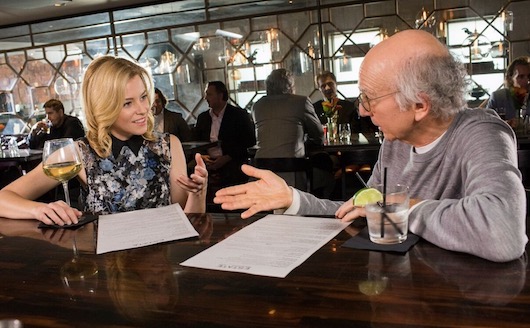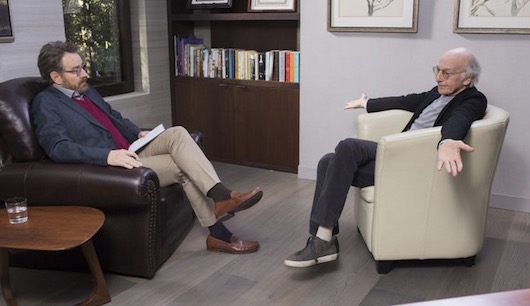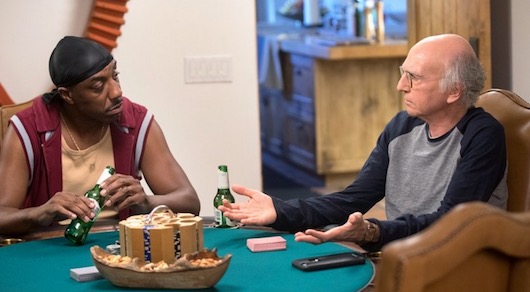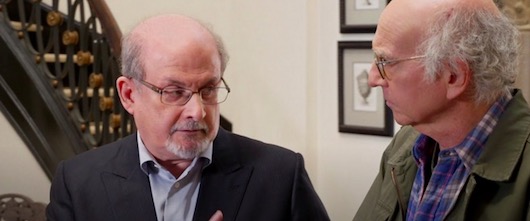
Bald Not Broken
by DICK CHENEY
Curb Your Enthusiasm
creator Larry David
Breaking Bad
creator Vince Gilligan
Being bald is more difficult than you can imagine. I remember the first hair I lost, really lost, floating among my blood and pus in the shower. It was so long I couldn't see the end of it. Every time I ran my fingers over my scalp, I was newly surprised by what I found.

As our nation's credit rating drops, a bald man (Alan fucking Greenspan) informs us that America "we can always print money." With this comment, Greenspan finally separated himself from the attachment to his idols Ayn Rand and Milton Friedman. Reading The Fountainhead, I never imagined Howard Roark bald, but looking back he probably shaved his head with a knife and ate squirrels. He didn't have time to try Rogaine, he had to blow up a building he thought was ugly. Baldness can be used for good or ill, just like Christianity or Pinkberry.

When I saw Aaron Paul bald in last night's Breaking Bad, something was altered deep within my carapace. In the bald community, Paul was known as a key holdout. The afternoon I realized that Sam Worthington actually had hair I screamed "William Fucking Buckley!" like I had seen a hairy ghost.
In the wake of certain people's proclamations that America itself is finished, bald men will have the last say. Every aspect of the culture has become a lightly veiled allegory for America's decline, although it is usually not so transparent as Boardwalk Empire. Yesterday I saw two entire families fighting over the last parking spot in the lot at Home Depot. Neither would move their car, so they just sat there. I almost cried, seeing that last hair in my tub, floating, immobile. But I did not cry.

Gifted with the hundreds of millions Seinfeld reaped for him when the show was sold into worldwide syndication, Larry David (Larry David) wants for nothing. After his wife Cheryl divorces him, he inspires his friend Marty Funkhauser to divorce his wife as well. All his closest buddies become suddenly single men in their 60s, and they find themselves the happiest they have ever been. Freed from the responsibility of being capable husbands and fathers to their children, they become children again themselves. (Larry even instructs one of his Girl Scout peers how to insert her tampon in an emergency.) The same thing happened in Rome, only without cable television.
Larry enjoys picking on women above all others on Curb. This is because they give him the reaction he desires. They make him feel alive because he wishes, despite his critical and financial success, to be rejected. In his heart of hearts, Larry believes he deserves to be scorned. Men compliment him on his superior comedy; women are the only ones capable of the disgust he senses when he masturbates to orgasm in the shower, or views his naked dome in the mirror.

Americans have taken most things for granted. An appointment is made, the person will show up. Larry's problems with bad parking, the selling of Girl Scout cookies, his friend's reaction to a Palestinian chicken restaurant, a german shepherd's last meal, Suzy's post-beverage sigh, his girlfriend's use of emoticons, have actually become comforting reminders of things we can control. Correcting such ethical lapses are a welcome distraction from the collapse of the society that surrounds Larry. In stark contrast, the men of Breaking Bad are afforded no such consolation.

In the first episode of Breaking Bad's brilliant fourth season, Jesse Pinkman (the newly bald Aaron Paul) watched a man's throat cut in front of him (by a bald man) as a threat. Instead of horror, or shock, or rage at the death, his steely-eyed look conveyed one emotion only: peace. He had come to terms with the event, he understood the man who committed the murder, and knew he could not be harmed by him, because he felt himself already gone. Why are you not watching this show?

When Breaking Bad debuted on AMC in 2008, it concerned itself with an Albuquerque chemistry teacher in the thrall of apparently terminal lung cancer forced into the production of meth so he could leave his family with enough money to survive. It was his brush with death and poverty that pushed Walter White (Bryan Cranston) over the edge, but he had already known himself to be divorced from the world before he learned he was dying.
Like many, Walt felt disconnected from American culture. His friends and family viewed him, smilingly, as a harmless intellect within their midst. "Oh Walt," they sighed to themselves, "this man is as meek and good-natured as a housefly." He viewed their polite condescension as an impetus for evil. Upon discarding several business partners, he entered into business with two bald men and never looked back.

A few bald men wear toupees, or use chemicals to attempt to regrow what they lost, but most do not. When I first became bald this surprised me. I used to tool around Wyoming in my Mustang, my toupee rippling against the wind, attempting to be the man I was before it happened. It took some time to realize that I could not go back to that, really, that there was more strength in the truth of what I was.
Jesse Pinkman has come to a similar realization. He is a meth user, a junkie, and now a somewhat experienced chemist. His partner in the production of this brilliantly lethal drug is Walter White, now compelled to hide the shame of his actions from his family, creating an elaborate cover story that allows him to claim his drug money as the spoils of a gambling addiction.

Here we have a rough parallel for the political debate in this country. Liberals want to cover up the loss of American exceptionalism, since for some reason they regard it as an indictment of the current administration, by writing a check. Conservatives wish to reclaim it by acknowledging what seems painfully obvious: we are one broke nation, and when you can't cover your bills, best practice is to start. Although both Jesse and Walt are guilty of a crime, it is Jesse who accepts that he must pay for it.
That douchey pinhead John Judis actually suggested the only way to climb out of the recession was to get involved in a war! I can't really blame him for forgetting we're currently fighting two. When liberals start advocating for war, I feel I have to zig where they zag.

The only people disappointed by an American fall from grace are those who actually think America is the greatest country in the world. Whether it is or isn't is not my point. A man with hair believes he is better than a bald man because he has hair; when that recedes, he philosophizes, "I may be losing my hair, but at least I am not completely bald."
He is a fool. No man is better than any other. I think I read that in Highlights or maybe that time I went to the vet and fell asleep reading a brutally boring copy of The Economist. The person who reads The Economist believes he is better than another person. The man with hair believes he is better than the man losing his hair. The man losing his hair believes he is better than the man who is bald. An American only has to be an American.
Dick Cheney is the senior contributor to This Recording. He last wrote in these pages about George R.R. Martin's A Dance With Dragons.








"Honky Tonk Hiccups" - Neko Case & Her Boyfriends (mp3)
"The Virginian" - Neko Case & Her Boyfriends (mp3)
"Thanks A Lot" - Neko Case & Her Boyfriends (mp3)

 TV
TV  Monday, October 23, 2017 at 8:39AM
Monday, October 23, 2017 at 8:39AM 





























































